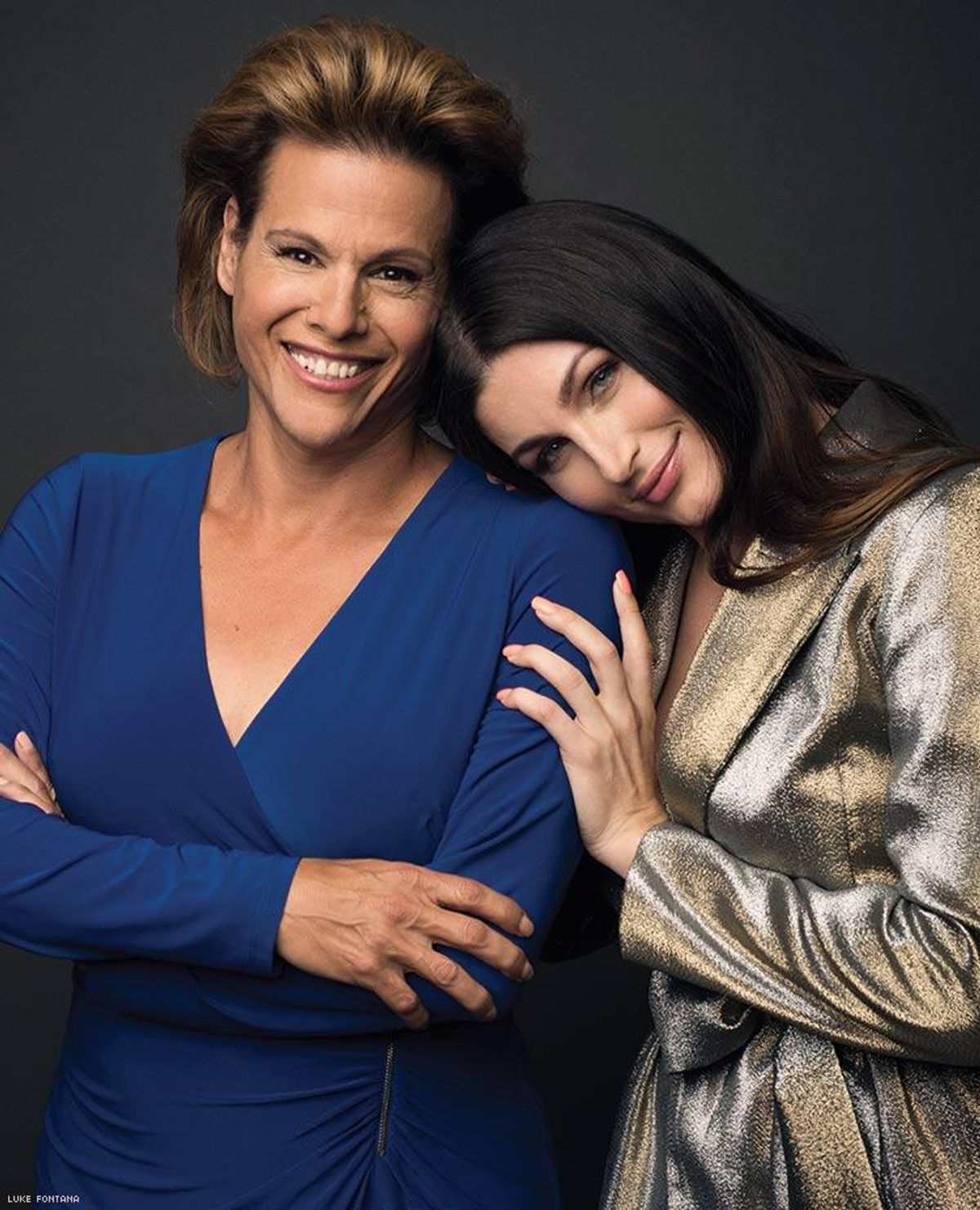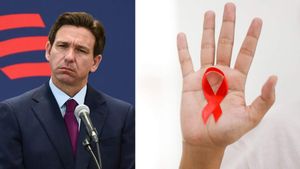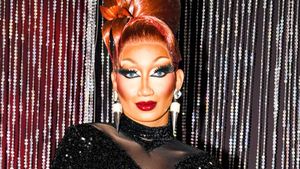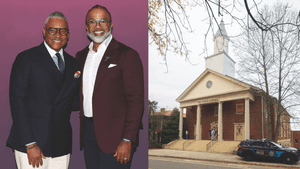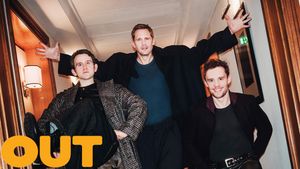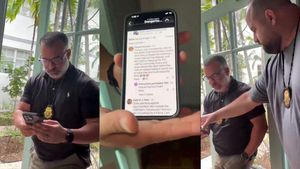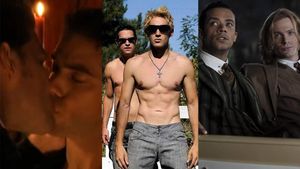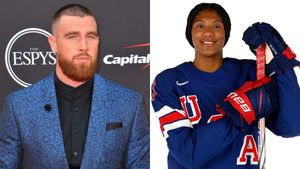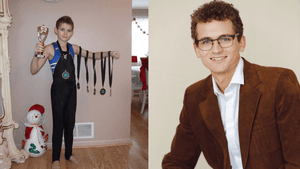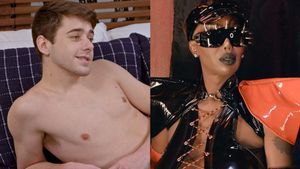I was waiting anxiously outside a hotel conference room to talk with Transparent stars Alexandra Billings and Trace Lysette, who had already sat for hours of interviews with other outlets answering the typical questions stars of a hit TV show are asked. The feeling that this day was special, was palpable. As I walked in to find the two women taking photos and laughing like old girlfriends, I knew they felt it too. After all, as Billings tells me, “20 years ago we wouldn’t have been let in this room.”
No one needs to remind these ladies that they’re standing on the shoulders of giants. In many ways, Billings herself is one of those giants. Before Caitlyn Jenner and Laverne Cox were household names, Billings was already a trailblazer, having been one of the first out trans actresses to play a trans role on television, in the 2005 TV prequel Romy and Michele: In The Beginning. (The first out trans actress in such a role was Jessica Crockett, who played a trans lesbian in a 2001 Dark Angel episode). In her decades in Hollywood, Billings has appeared in numerous films and TV shows (including How to Get Away With Murder and Grey’s Anatomy), but few roles were as groundbreaking and captivating as Billings’s scene-stealing role of Davina on the hit Amazon series, Transparent.
As a mixed-race trans woman like the actress who plays her, Davina’s friendship with Maura — the affluent, Jewish lead character — is a way for the series to talk about its own privilege, to underscore the ways in which women of color are far more vulnerable to violence, and to truly address intersectionality in a real-life way that doesn’t require a textbook to understand.
Now in its fourth season, Transparent hit another milestone when Billings became the first out trans actress to have a full-frontal nude scene on a TV show (she’s likely the first out HIV-positive person to do so as well).
Billings’s costar Trace Lysette is also blazing trails as Shea, a young transgender, HIV-positive yoga instructor who teaches the lead character Maura (Jeffrey Tambor) how to say phrases like “Yas queen!” while having a brief fling with Maura’s son Josh — becoming one of only a handful of trans actresses to be portrayed having intimate relations with a cisgender man on screen (following Candis Cayne’s groundbreaking role in Dirty Sexy Money).
Although she’s HIV-negative in real life, Lysette takes the responsibility of playing a character who is both trans and poz very seriously: “The responsibility is always on my mind, and I don’t take any of it for granted.”
Billings, who is HIV-positive in real life and in the show, knows the power of art and how it shapes culture. A staunch advocate for HIV health initiatives, she’s been in the trenches since the early days of ACT UP. And like the legendary playwright and AIDS activist Larry Kramer who founded that organization, Billings acknowledges she’s dealt with a lot of anger.
“I have a lot of rage,” she recalls telling Kramer when she starred (alongside Greg Louganis) in a Chicago production of Kramer’s play Just Say No. “But I’d like it to be directed, because when it’s not, it gets way out of control… and nothing gets served.”
Kramer, Billings says, replied, “‘I disagree completely. I think any anger is righteous anger.’” The activist’s response explains a lot about Kramer’s confrontational style — and how it differs from Billings’s own efforts to make the world a better place.
Being of service is a mantra for Billings, who admits to not believing in “good and evil” but rather a conscious choice to be “in service” to the world. Growing up with a musical director father, Billings has been around artists since the age of 7. One might say she was born in service to the art that’s shaped her life.
Billings, whose life was documented in the 2009 Emmy Award-nominated PBS doc Schoolboy to Showgirl: The Alexandra Billings Story, told her story there and in the famed touring off-Broadway autobiographical show, Before I Disappear.
“I was raised around queers,” she says. “My whole life has been just gay, it couldn’t be gayer. For the longest time, it was hard for me to be around [hetero-normative people]. I didn’t really understand them. The bullying that I endured when I was young was very confusing to me because I would visit my father every summer and be around the LGBT clan and I was like, ‘I don’t understand. This [queer] world is much kinder and these are supposed to be the ostracized? This doesn’t make any sense.’”
Lysette also found her home in the queer community: first in the drag bars of Dayton, Ohio, and later in the ball scene of New York City. “I was a performer [in Dayton] as a teen and had a fake ID,” she remembers. “My chosen family kind of validated me throughout the years and let me know that I was special, and particularly in the New York-hosted ballroom subculture, the voguing subculture. I found a chosen family there where I was being celebrated for being feminine, and everything I had always been put down for… that validation really carried me through.”

Competitions were once a major part of Billings’s life as well. In fact, her character’s arc in the latest season of Transparent is plucked directly from her own experiences competing in the Miss Continental beauty pageant at Los Angeles’s legendary drag club, The Queen Mary. Clips from Billings’s personal home videos grace the screen during this season’s title sequence.
Years before, however, when Billings was first transitioning, her life wasn’t as glitzy or glamorous. Back then, being a trans woman while also maintaining her relationship with a woman (she’s been with her wife for 43 years) was hardly commonplace. And while she’s the first to tell you their relationship seems like a fairy tale now, it wasn’t always a bowl of cherries.
“I caught flak from most every community, with the exception of the trans community,” she says of that time. “It was 1980… We were just 10 years out of Stonewall. We were still figuring things out.”
Billings recalls there hardly being a discussion about her trans identity with her wife. “She knew, because my wife knows everything,” she says. “She knew and she was not happy. We’re not going to pretend that it went well. It did not go well. We didn’t speak to each other for about two years. We didn’t speak and we talked to each other every single day, and have for over 40 years, and for those two years, nothing, because it was just... Who handles that transition well? I didn’t handle it well.”
Three decades later, the world has changed insurmountably. According to GLAAD, 2016 featured the highest percentage of LGBT series regulars the organization has ever found on TV, with 4.8 percent of all characters being gay, lesbian, bisexual, trans, or queer-identified. With 43 LGBT characters out of 895 that number is still low, but dramatically better than in the past.
Unfortunately, the same cannot be said for HIV-positive characters. The few poz characters we see on mainstream television aren’t a huge leap from Michael Pierson, the character played by Aidan Qunn in 1985’s An Early Frost, the first made-for-television movie addressing AIDS; or Tom Hanks’s Andrew Beckett from 1993’s Philadelphia, one of the first mainstream Hollywood films to acknowledge not only HIV, but also homosexuality and homophobia. On screen, Beckett’s HIV progresses to the point of purple lesions (Kaposi’s Sarcoma) appearing on his face and his wasting away — the widespread image of HIV in the years before antiretroviral cocktails turned the disease into a manageable chronic condition.

Fortunately, Lysette’s character in Transparent experiences none of these things. On the contrary, she’s healthy, vibrant, and sexually active — a huge leap from days of old, and a springboard towards eradicating HIV stigma.
A long-term survivor of HIV, Billings recalls one of the most traumatic moments in her life: wrapping her best friend, who had died of AIDS- complications, in a sheet and leaving her body on the steps of a hospital because Billings hadn’t been able to find a cemetery willing to let her bury her friend due to fear the disease might “contaminate the soil.”
Even though we’ve come a long way from those dark days of ignorance and death, Billings knows we still face challenges in increasing the visibility of healthy poz people while maintaining prevention awareness. The U.S. saw 39,513 people newly diagnosed with HIV in 2015, according to the Centers for Disease Control and Prevention.
“I want to take them by the hand and say, ‘You need to be mindful now,’” she says of those newly diagnosed. “‘Now your job is to turn your behavior around.’”
Getting on and staying on antiretroviral medications can be a part of that behavioral change. Not only will doing so improve the health of those who are HIV-positive, it can also prevent transmission of the virus once the treatment lowers a person’s viral load to undetectable levels.
Billings, who was diagnosed positive in 1994, adds: “I have had it with irresponsible queers. I’m done placating. I’m not done being kind, but I’m done being nice. Nice is a state. Kindness takes action. If you got this [virus], if you got infected in the year 2017, you now need to take responsibility. And that means you’ve got to be of service. You do not get to go back to… your old behavior. You’ve got to figure out something new to do. Be a mentor. Don’t look for mentors. Be a mentor. That’s your job now, and I think that’s true of the trans community, too.”
The truth of the matter is Hollywood producers aren’t eager to tell the stories of HIV-positive people, or trans people — much less HIV-positive trans people.
“Trace and I don’t have to join the revolution. We are the fucking revolution,” Billings proclaims. “So our job isn’t to say, ‘Hey you guys, look at what great human beings we are.’ Our job is to say, ‘What are you going to do? We’re loud. We’re big. We took up enormous space. What are you going to do? We will help you do that. Now you help us do that.’ The people we go to meet in Hollywood… they’re half my age. I just had a meeting in a room full of people that were in their 30s for fuck’s sake. I’m almost 60. You help me.”
Following the recent fallout over sexual harassment and assaults, Hollywood producers are being pressured to create more diversity behind the scenes, as well as hold perpetrators accountable. According to Lysette, Hollywood has its share of powerful men who take advantage of trans women, as well. Billings and Lysette admit these kinds of predators are more than willing to have sex with trans women, but wouldn’t admit to dating — or god forbid falling in love with — them. “There are so many powerful [people] who have an affinity or are open to trans women and have indulged with us between the sheets, who won’t come out and talk about it,” Lysette explains. “Hollywood is riddled with them. If I gave you the list, heads would roll, and headlines would be made. But I feel it is their job to step up and speak out.”
Lysette did speak out recently, alleging sexual misconduct on the part of Tambor, after another trans woman anonymously complained about the actor, reports The Advocate. The move pushed the show into legal limbo; as of press time Amazon is investigating the allegations.
Still, that stigma that persists in Hollywood and elsewhere, around dating trans women is ultimately the same unspeakable truth underscoring many trans homicides. According to the Human Rights Campaign, nearly 24 trans people had been fatally shot or killed by other violent means in 2017 as of November — the majority of them were trans women of color.
“I don’t think the world was paying attention to trans homicides prior to a few years ago,” Lysette says. “I transitioned in Brooklyn, and took the subway every day… avoiding 3:45 p.m. at all costs, because that’s when school let out, and high school kids are the first ones to try it. I think that’s the world... You know, it was engraved in me that you have to protect yourself and you have to be really, really careful. A lot of us who were murdered prior to four years ago, even, were misreported and misgendered when they found the bodies. I think that the world is finally starting to pay attention.”

Billings takes the issue a step further: “We need to have the right conversation… about how we’re raising our little boys, because we need to remember, who’s doing the killing? These are men, all of them. There is no such thing — not one case — where a female has murdered a female transgender human being. Not one. We need to look at the fact that most of these humans that are murdered are trans females of color.”
Billings adds that people, “still believe that being transgender is a choice, a fetish, or a custom. We still believe that’s true. No matter how much medical science there is to prove otherwise, we still believe that’s true.”
She thinks that the way Americans gender children is part of the problem.
“We teach our little boys: blue is for boys, violence is for boys, aggression is for boys, power is for boys. Softness is for girls, ease is for girls, and smaller spaces are for girls… Say this, sound like this, behave like that — and thus we treat other human beings that way.”
Billings argues that the inevitable extension is discounting those who are differently gendered as though “this human being isn’t a human being anyway. All we know is that we like to have sex with this human and that makes you a homo. Kill it. And that’s what happens. It doesn’t happen in the reverse. Women don’t learn that. That’s what men learn. What are we teaching our little boys and how are we parenting?”
Together, Billings and Lysette continue to rise hand-in-hand as soul sisters and trailblazers for a future generation — one that doesn’t promote such binary thinking. At least that’s the goal.
“Life is not black and white. Neither is gender. Neither is drag. Neither is a lot of things,” Lysette says. “I think that sometimes labels are not all-encompassing. And so sometimes you have to use a sentence or two to explain who and what you are or what you believe in. And I think that we need to stay away from the boxes... It’s good to be able to identify with the movement, to identify with something. But 20 years from now, do I want to be labeled a transgender actress? I’m an actress. I’m a woman. I happen to be trans.”
Looking at where she’s come from, Billings can’t help but smile and surrender to her own story. “I am the contributing writer to my own story and my only job is to listen and just keep writing. That’s all I know. Everything else is up for grabs.”
